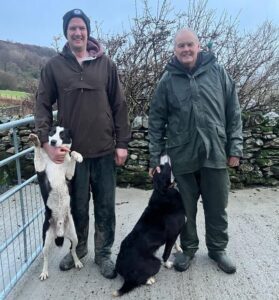Third-generation farmer, Ifan Ritchie farms 1,500 ewes up on the hills in Conwy with his father, alongside 70 head of suckler cattle.
The flock at Blaen Y Coed is a mixture of mules and Welsh Mountain cross Derbyshire Gritstone to make the most of the different terrain and environments they have. They also have land in Anglesey and Cheshire to optimise the performance of the flock. Around 850 mules achieve 190 – 200% lambing percentage, with the majority of lambs supplied to Dunbia. “We are consistently hitting the weights and market specifications” Ifan comments, “the aim is to get the lambs gone by end of July”.
The remaining 650 ewes must suit the hill and upland ground, this is where the Welsh Mountain cross Derbyshire Gritstone ewes thrive. With these ewes, the lambing percentage is not quite as high, typically around 150%. “We would not expect higher due to their natural genetics and resilience needed for a mountain ewe, as long as we get a strong, healthy lamb from each ewe, we are happy,” Ifan comments. Ifan and his father start lambing in February through to April, predominantly all inside.
Around 6 weeks prior to lambing, the mules (being the less hardy of the breeds on the farm) are brought inside and fed according to the requirement through silage and NWF’s Ewetrition Rolls. “We have been on the rolls for many seasons now, and they are a solid compound which we trust.” These ewes are put to a Texel Beltex tup to get that commercial growth and animal which the market is demanding. “We have found that managing the ewes in this way promotes their milkiness, which is half the battle for strong lambs,” Ifan comments. “Looking after the ewe now will help her look after herself and her lamb” he adds.
Poor feeding of ewes pre-lambing brings multiple problems which are detrimental to the business. “Every sheep farmer has concerns about twin lamb, and it does happen from time to time at Blaen Y Coed, but it is minimal and cases are manageable,” Ifan comments.
In addition to making the most out of the natural resources with their flock converting grass to meat, the family have a water turbine converting rain and water into green energy. This energy is put back into the grid or used on the farm. “With all the rain we get in Wales, it only made sense to make the most of it!”.
For the future, Blaen Y Coed are wanting to retain similar ewe numbers with a focus on nincreasing efficiencies. They want to increase suckler cow numbers along with continuing to investigate ways of utilising other natural resources to increase the farm’s sustainability and resilience.
We wish the Ritchie family all the best for the future and want to give a Diolch yn Fawr for giving us an insight into their home and business.
For further information on NWF ew & lamb compounds, blends or associated products, please speak to your local NWF Sales Specialist, call or 0800 756 2787 or visit our sheep product page.
